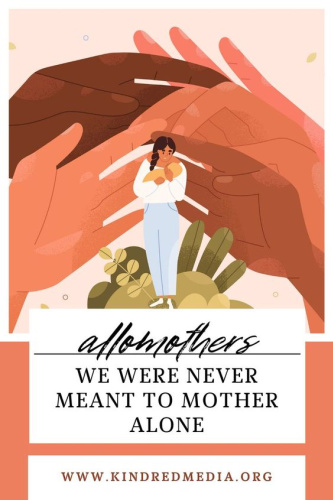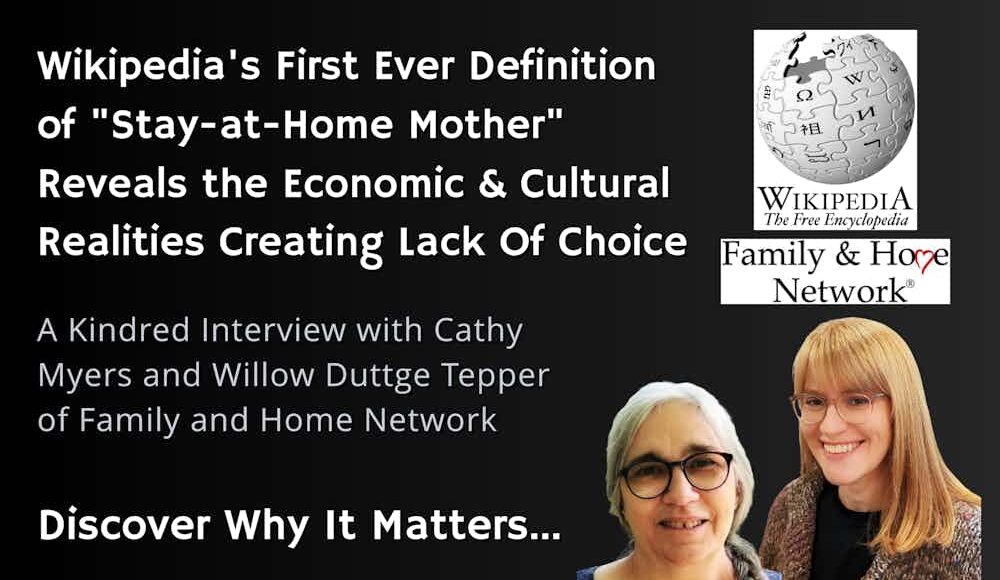Wikipedia’s First Ever Definition of “Stay-at-Home Mother” Reveals Economic & Cultural Realities Creating A Lack Of Choice
A podcast interview with the women who crafted the new definition.
Last year, Family and Home Network (FAHN) discovered the Wikipedia page for “Stay-at-Home mother” redirected readers to the pejorative term “Housewife.” Informed by forty years of advocacy for parents who wish to stay home with their babies and children, FAHN crafted the first ever Wikipedia entry for Stay-at-Home mother. The heavily cited entry exposes the culturally-engineered myth that pits working mothers and stay-at-home mothers against each other by sharing the economic reality that most women, 57%, do not have a choice to work or stay home but instead float between home and work out of necessity. Furthermore, labor statistics on Stay-at-Home Mothers are collected in such a way the dynamic and large population of SAHMs have been represented as small and ineffective, when the opposite is true. The Stay-at-Home Mother entry launched on Wikipedia on May 7, 2024.

“Stay-at-home mothers are often ignored or stereotyped in cultural and political conversations. Although stay-at-home parents do essential work, they’re not considered part of the workforce and their work is not counted in the GDP,” says Willow Duttge Tepper, member of the FAHN Board of Directors and lead of the project.
“Though homemaking skills should never be denigrated, at-home mothers must not be misidentified as housewives,” says Catherine Myers, Executive Director of FAHN. “Most at-home mothers are focused on their children’s needs and on their own desire to spend time together with their children. Family and Home Network is happy to set the record straight.”
FAHN has four decades of experience listening to and speaking up to dispel misconceptions about at-home mothers, and the team brought that knowledge to the Wikipedia entry. It’s important because all families must be included in family policy, and many families with an at-home parent are economically vulnerable.
Unfortunately most U.S. family policy is crafted through the lens of “working families,” leaving out at-home mothers and at-home fathers, who are forgoing paid employment in order to care for their children by choice or by circumstance. FAHN found that stay-at-home fathers have their own Wikipedia page, and now stay-at-home mothers have one too.
“Care has value, whether it’s done by child care providers or by parents themselves,” says Myers. “At-home mothers, at-home fathers, and other unpaid caregivers must be recognized and their care counted and supported with equitable, inclusive family policies.”

Because Wikipedia is a publicly accessed site, the new entry has already seen changes, including elimination of some of the paragraphs that expand on the misrepresented labor statistics around SAHMs. Kindred has posted FAHN’s original definition of the term, complete with citations, in our New Story Glossary here.
Kindred is also proud to have Darcia Narvaez’s award-winning book, Neurobiology and the Development of Human Morality, listed as the first citation on the SAHM Wiki page. You can learn more about this book, and read its introduction and first chapter, in its 10th anniversary celebration interview with Darcia here. You can learn more about centering the needs of children as a path to cultural transformation in our Evolved Nest Initiative posts on Kindred and on the Evolved Nest’s website. Kindred Magazine is a sister initiative of the Evolved Nest Initiative through the award-winning nonprofit, Kindred World. FAHN is a nonprofit partner of Kindred World.
FAHN is a grassroots nonprofit organization founded by three at-home mothers in 1984, and originally named Mothers at Home. In 2002, recognizing the many creative ways mothers and fathers care for their children, and knowing that today’s “working mother” or “working father” might next year be “at home” and vice versa, the organization chose a new name: Family and Home Network. Today, the organization celebrates 40 years of offering parents affirmation, information and advocacy. FAHN urges policymakers to adopt principles of Inclusive Family Policies.
Listen to the Interview
RESOURCES
Visit Family and Home Network
See the original SAHM Wikipedia Entry by FAHN
Learn more about how our species’ typical way of raising children is through community, not one person in isolation, by discovering our evolutionary pathway to wellbeing, our Evolved Nest.
Discover Kindred’s posts and podcasts on motherhood and capitalism.


